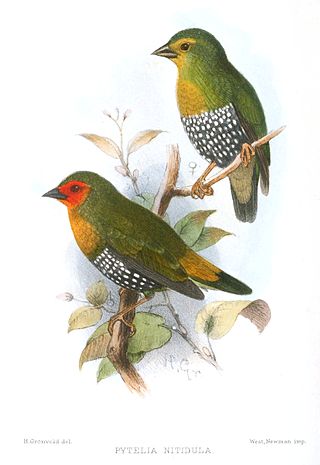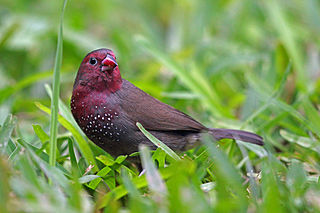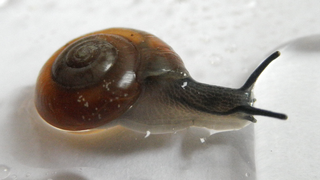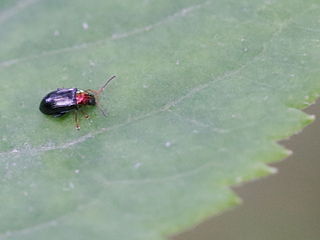
The green-backed twinspot or green twinspot is an estrildid finch found in many parts of Sub-Saharan Africa. The IUCN has classified the species as being of least concern.

The brown firefinch is a common species of estrildid finch found in Southern Africa. It has an estimated global extent of occurrence of 1,300,000 km2.

Aegopinella nitidula, common name the waxy glass snail, is a species of small land snail, a terrestrial pulmonate gastropod mollusk in the family Gastrodontidae, the glass snails.

Cylichna is a genus of sea snails or bubble snails, marine gastropod molluscs in the family Cylichnidae, the "chalice bubble snails".

Acontia nitidula, the Brixton beauty, is a moth of the family Noctuidae. The species was first described by Johan Christian Fabricius in 1787. It is found in South Africa, Europe, China, Japan and throughout India and Sri Lanka. It has also been recorded from Great Britain, but this record is doubtful.
Acrocercops nitidula is a moth of the family Gracillariidae, known from West Bengal, India. It was described by Henry Tibbats Stainton in 1919.

Anthaxia nitidula is a species of jewel beetles belonging to the family Buprestidae, subfamily Buprestinae.

Habrodera is a genus of beetles in the family Cicindelidae, containing the following species:

Sarcophaga carnaria is a European(globalized) species of flesh fly within the common flesh fly genus, Sarcophaga.

Tiberia nitidula is a species of sea snail, a marine gastropod mollusk in the family Pyramidellidae, the pyrams and their allies.

Crepidodera nitidula is a species of flea beetle from the Chrysomelidae family that can be found everywhere in Europe except for Albania, Andorra, Croatia, Greece, Ireland, Liechtenstein, San Marino, Spain, Vatican City, and various European islands.
Dirhinosia nitidula is a moth of the family Gelechiidae. It is found in Israel, Syria, Lebanon and Turkey.

Ruspolia nitidula, the Large Conehead, is a species belonging to the subfamily Conocephalinae of the family Tettigoniidae. It is found throughout Europe, Africa, and the Palearctic part of Asia. A vernacular name that has been used is "cone-headed grasshopper", although it is not a grasshopper, but rather a bush cricket.

Nitidula is a genus of sap-feeding beetles in the family Nitidulidae. There are more than 20 described species in Nitidula. Some species breed in carrion while others are associated with later stages of decay in mammalian corpses and can be used in forensic investigations.
Nitidula flavomaculata is a species of sap-feeding beetle in the family Nitidulidae. It is native to the Mediterranean Region and naturalized in North America. It is associated with later stages of decay in mammalian corpses. It can be used in forensic investigations.

Nitidula bipunctata, the two-spotted sap beetle, is a species of sap-feeding beetle in the family Nitidulidae. It is found in Europe and Northern Asia and North America.

Nitidula rufipes is a species of sap-feeding beetle in the family Nitidulidae. It is found in Europe Northern Asia and North America.

Pseudopamera nitidula is a species of dirt-colored seed bug in the family Rhyparochromidae. It is found in Central America and North America.

Strigilla is a genus of bivalves belonging to the family Tellinidae.
















